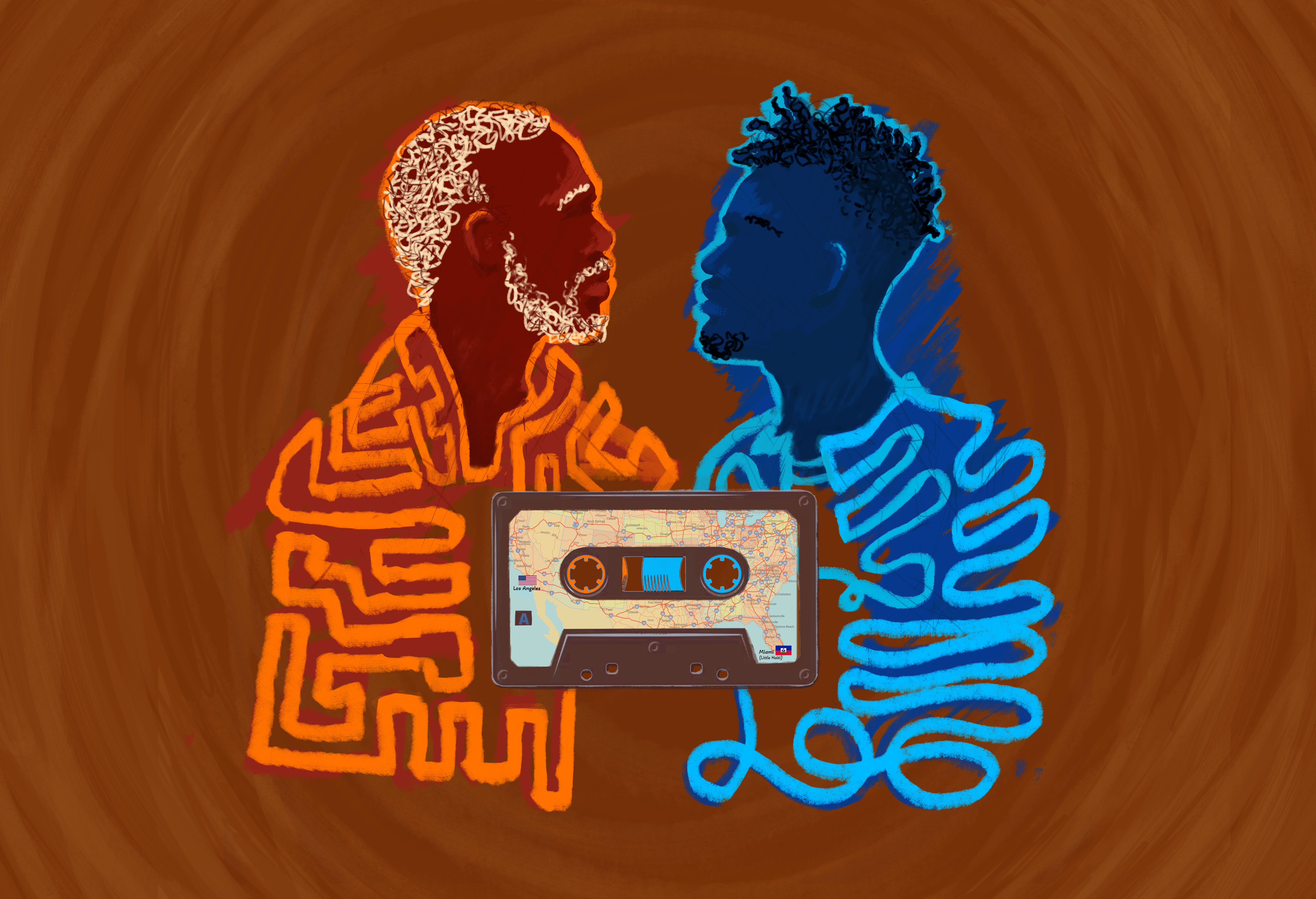Humanity. Melody. Storytelling.

The intimate and powerful tale of an estranged father and son drives the narrative allure of Haitian American playwright and television writer Jeff Augustin’s play with music Where the Mountain Meets the Sea.
The engaging, monologue-driven story depicts fascinating parallel journeys on different timelines. After he learns of his father’s death, Jonah, a child of Haitian immigrants living proudly as a gay man in Los Angeles, recreates the cross-country road trip his parents took across the U.S. before his birth. As Jonah’s trip unfolds through new discoveries, including new love, his father, Jean, shares compelling insights into his journey from Haiti to Miami in search of a better life.
Augustin’s reverence for his family’s oral storytelling traditions factors heavily into his work and particularly Where the Mountain Meets the Sea, which was selected for the 2020 Humana Festival of New American Plays in Louisville, Kentucky, and later had an off-Broadway run at Manhattan Theatre Club.
Augustin embraces the strengths of unique stories that have been passed down to him and continue to influence him. “I grew up listening to magical and fantastical stories, many based on Haitian folklore and vodou figures,” Augustin said in a statement on his website. “I never knew what was real or supernatural, or if the supernatural was just as real as I. In these stories, characters were constantly running from their family and their land in search for a new identity. But in a world where spirits and God guide life, these characters were bound to their destinies. These oral and mythical traditions have heavily influenced my writing. The other worldliness, the power of language, the poetry and rhythm are all integral ingredients in my work.”
The Playhouse production will be directed by returning favorite Timothy Douglas, who staged Primary Trust last season and helmed Where the Mountain Meets the Sea’s 2024 Washington, D.C., area premiere at Signature Theatre in Arlington, Virginia. Douglas is particularly moved by the central relationship at the heart of the story on a deeply personal level.
“The theme that resonates the most for me is the father of a particular generation confronting a gay son, something he didn’t want to have to deal with and never really did,” Douglas said. “While I maintained a respectful, interactive and warm relationship with my father throughout his life, he never really was able to fully take me in and, as a result, I was never more fully able to share my life with him. The journey of Black father Jean and Black queer son Jonah finding each other through this lyrical piece very fluidly, adds fluidity to how I reflect upon my father specifically and then my relationship with my father. It softens my life journey by way of my creative journey.”
.jpg?sfvrsn=79ea1180_1)
Pictured Above: Rob Morrison (Music Director/Musician), Rachel Fobbs (Musician) and Isaiah Tyrelle Boyd (Jonah) in rehearsal for Where the Mountain Meets the Sea.
Augustin’s palpable storytelling is accented by the beautifully contemplative indie folk music by The Bengsons, a married composing and performing duo based in New York City. Winners of the Jonathan Larson and Richard Rodgers Awards, their theatre work includes Hundred Days, and Sovereignty Hymns, and they are also known for their viral hit, “The Keep Going Song.” Three of their singles were also featured on FOX’s reality TV competition show So You Think You Can Dance.
“The Bengsons are incredible,” said Rob Morrison, reprising his duties as musician and music director having served in both capacities for the aforementioned D.C. premiere. “Musically, their writing is always surprising. They also know how to tell a story, and they tell it in a very honest way that’s from the heart.”
Morrison is also impressed by the emotional scope of the script and songs. Augustin’s depth complemented by The Bengsons poetry creates a universal experience he’s confident will connect with Playhouse audiences.
“This story is about humanity — seeing humanity in your parents, family, children or somebody you’ve had a difficult, complex or complicated relationship with,” Morrison said. “And maybe you’ll learn something about somebody you thought you knew which will hopefully add an openness or curiosity. Maybe the story I told myself about a certain person wasn’t entirely true? And having done the show at the Signature in a smaller space which shares a similar size to the [Rosenthal Shelterhouse], almost every night there was nary a dry eye in the house by the end of the show. This show is universal.”